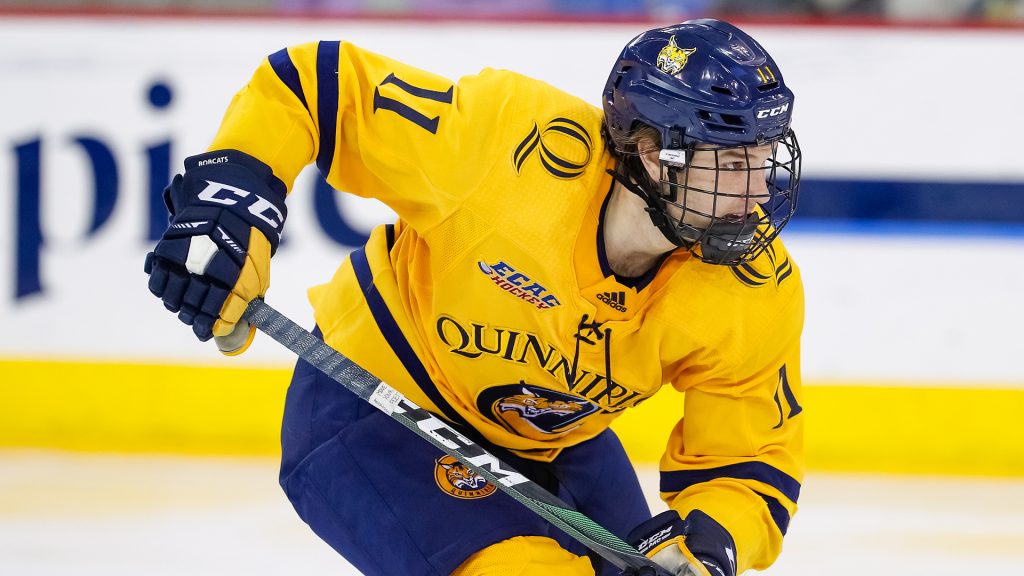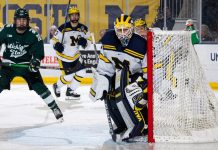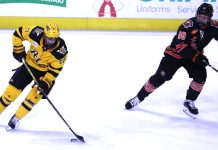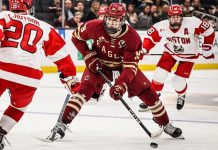
Before looking ahead to weekend games against Harvard and Dartmouth, Quinnipiac coach Rand Pecknold took a minute on Monday to reflect on his program’s transformation over the last 10 years from scrappy underdog to perennial contender.
“It was a great decade of hockey for Quinnipiac, there’s no question,’’ said Pecknold, who in 26 seasons has guided the Bobcats from Division II independent to the MAAC and then Atlantic Hockey before joining the ECAC in 2005.
By sweeping Princeton last weekend, the Bobcats finished with 226 wins from Jan. 1, 2010 to Dec. 31, 2019, fourth-most in the country. Along the way, Quinnipiac went to two Frozen Fours and five NCAA tournaments as well as taking home four Cleary Cups.
“Certainly we’ve emerged into a top 20 or top 10 program. I give a lot of credit to the players we have and the commitment they have,’’ Pecknold said.
“A big reason for that is not only do we have good players, but we have a great culture. That’s what we thrive on. Joe (Dumais) and Billy (Riga), my assistants, do a really good job of recruiting the right type of high-character kids with high compete levels and that’s kind of how we play.’’
After an up-and-down first half, Pecknold and company will look to build on their three-game winning streak this weekend against Harvard and Dartmouth at home.
The team’s signature victory so far is a 2-1 decision on the road against a strong UMass squad on Nov. 30.
“That was probably our best game of the year. We’re young, real young. Freshman, sophomores all over the place and we’re immature at times. For really the first 60-minute time all year, we were fully committed to making sacrifices and playing to our identity. Then we don’t play for four weeks, which wasn’t great, but it is what it is,’’ he said.
Back in action last weekend, the Bobcats won 3-1 at Princeton, then got a late goal from Wyatt Bongiovanni for a 4-3 victory in the rematch at home.
“Princeton played well both nights. It wasn’t our best hockey but we were resilient and found a way to win both nights,’’ said Pecknold. “Typically, every game we play is like three games. Every period is a different game. It’s hard to compete for championships when you play like that. We need to mature and play a 60-minute game.”
With 11 freshmen and 10 sophomores on the roster, maturity will be a work in progress. Pecknold praised the play of rookies Skyler Brind’Amour and Jayden Lee, who scored his first goal of the season at Princeton.
“When you’re 18 years old, it’s hard to play college hockey when you’re playing against 24- and 25-year-old men. For some of our guys, it’s going to take a little longer than for others. Brind’Amour’s been great. He’s been our best freshman. I’ve been very happy with him. He’s been the first or second line center now for a little bit, killing penalties and doing everything,’’ said Pecknold.
“And Jaden Lee is coming along. He’s a true freshman, an 18-year-old. We brought him in when Brogan Rafferty went to the Canucks. It’s been a little up and down for him but he’s started to settle in and he’s been really good the last four games. We’re happy with his maturity but, again, he’s 18 and he needs to fill out. We don’t have the luxury of kind of hiding him. He was great this weekend.’’
Junior goalie Keith Petruzzelli has been excellent in his last eight games since allowing three goals on seven shots in a loss at Harvard.
“Before Sunday’s game, he had .944 (save percentage) in his last seven games, so that’s great. (Sunday) night he was good again,’’ said Pecknold.
“He’s been really good after kind of a slow start. Petro’s made some adjustments. Justin Eddy the goalie coach has done a good job with him. He’s emerging to what we thought he could be.’’
Pecknold said he had both of this weekend’s opponents, Harvard and Dartmouth, in the Top 20 on his ballot this week.
On the road in early November, the Bobcats tied Dartmouth and were blitzed 7-2 by the Crimson.
“It was just a sloppy game. We were immature, took penalties, didn’t defend, so (Friday will) be a good test. I always like the challenge of playing Harvard. They’ve got so much high-end talent and (coach) Teddy (Donato) does a really good job with them. It will be a good battle for us,’’ Pecknold said.
Goal-starved Dutchmen
Union is in its best stretch of the season at 3-2-1 in their last six, but the offensive struggles continued for the Dutchmen last weekend as they lost 2-0 to Vermont and tied Providence 1-1 at the Catamount Cup.
Here’s how coach Rick Bennett puts it: “No one is going to confuse us with the ’85 Oilers, that we do know.’’
Union has scored just 30 goals in 19 games. They are scoring on only 6.8 percent of their shots, third-worst in the country. At 9.3 percent, the power play is tied for fourth from the bottom.
“You have to create your own puck luck. The thing with puck luck is, do you want to get to the net or don’t you? In a few games this year we didn’t do that, but recently we’re getting better at it,’’ said Bennett.
Making the grade
When you are sitting back enjoying a game, it can be easy to overlook the student half of the student-athlete equation.
The UMass-Brown game on Dec. 10 was played during the exam period at Brown. A handful of Bears players who were not dressed for the game sat in the stands at Meehan Auditorium with their laptops open and did schoolwork between periods.
Coach Brendan Whittet, a Brown alum, could not recall seeing that in past years.
“Changing times, I guess. I don’t know if we have more-serious students or more-conscientious students or it’s just the makeup in general of the type of players we have,’’ he said.
“You have to be very cognizant of (the academic workload of the players) because they are student-athletes at one of the best academic schools in North America. These guys are up on campus in a classroom setting much more than they are down in the rink. It’s a big part of who they are. You’ve got to be a little understanding as a head coach,’’ Whittet said.


